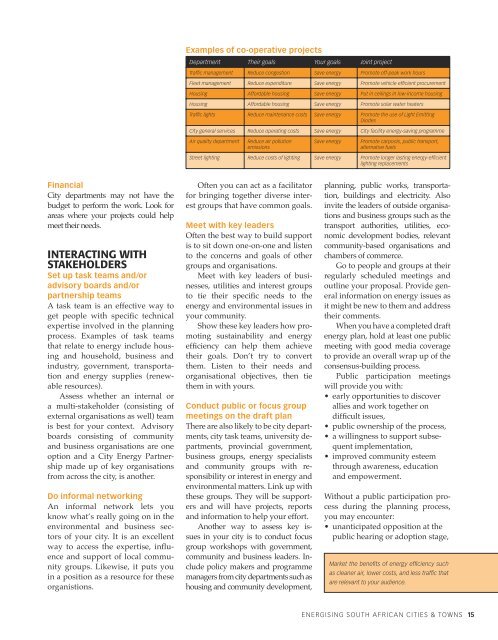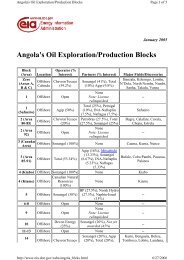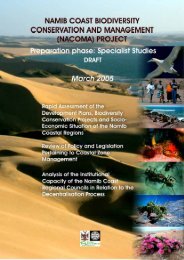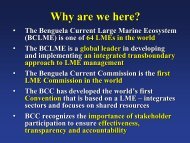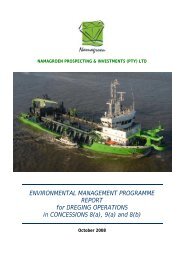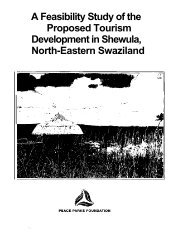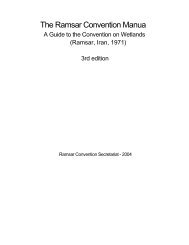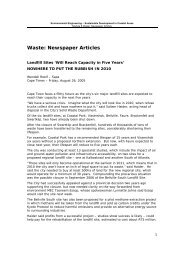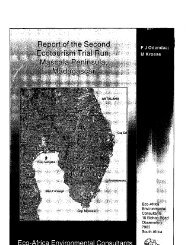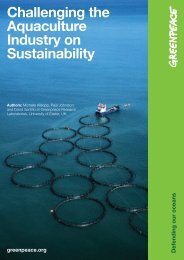Energising South African Cities & Towns - City Energy Support Unit
Energising South African Cities & Towns - City Energy Support Unit
Energising South African Cities & Towns - City Energy Support Unit
You also want an ePaper? Increase the reach of your titles
YUMPU automatically turns print PDFs into web optimized ePapers that Google loves.
Examples of co-operative projectsDepartment Their goals Your goals Joint projectTraffic management Reduce congestion Save energy Promote off-peak work hoursFleet management Reduce expenditure Save energy Promote vehicle efficient procurementHousing Affordable housing Save energy Put in ceilings in low-income housingHousing Affordable housing Save energy Promote solar water heatersTraffic lights Reduce maintenance costs Save energy Promote the use of Light EmittingDiodes<strong>City</strong> general services Reduce operating costs Save energy <strong>City</strong> facility energy-saving programmeAir quality departmentReduce air pollutionemissionsSave energyPromote carpools, public transport,alternative fuelsStreet lighting Reduce costs of lighting Save energy Promote longer lasting energy-efficientlighting replacementsFinancial<strong>City</strong> departments may not have thebudget to perform the work. Look forareas where your projects could helpmeet their needs.INTERACTING WITHSTAKEHOLDERSSet up task teams and/oradvisory boards and/orpartnership teamsA task team is an effective way toget people with specific technicalexpertise involved in the planningprocess. Examples of task teamsthat relate to energy include housingand household, business andindustry, government, transportationand energy supplies (renewableresources).Assess whether an internal ora multi-stakeholder (consisting ofexternal organisations as well) teamis best for your context. Advisoryboards consisting of communityand business organisations are oneoption and a <strong>City</strong> <strong>Energy</strong> Partnershipmade up of key organisationsfrom across the city, is another.Do informal networkingAn informal network lets youknow what’s really going on in theenvironmental and business sectorsof your city. It is an excellentway to access the expertise, influenceand support of local communitygroups. Likewise, it puts youin a position as a resource for theseorganistions.Often you can act as a facilitatorfor bringing together diverse interestgroups that have common goals.Meet with key leadersOften the best way to build supportis to sit down one-on-one and listento the concerns and goals of othergroups and organisations.Meet with key leaders of businesses,utilities and interest groupsto tie their specific needs to theenergy and environmental issues inyour community.Show these key leaders how promotingsustainability and energyefficiency can help them achievetheir goals. Don’t try to convertthem. Listen to their needs andorganisational objectives, then tiethem in with yours.Conduct public or focus groupmeetings on the draft planThere are also likely to be city departments,city task teams, university departments,provincial government,business groups, energy specialistsand community groups with responsibilityor interest in energy andenvironmental matters. Link up withthese groups. They will be supportersand will have projects, reportsand information to help your effort.Another way to assess key issuesin your city is to conduct focusgroup workshops with government,community and business leaders. Includepolicy makers and programmemanagers from city departments such ashousing and community development,planning, public works, transportation,buildings and electricity. Alsoinvite the leaders of outside organisationsand business groups such as thetransport authorities, utilities, economicdevelopment bodies, relevantcommunity-based organisations andchambers of commerce.Go to people and groups at theirregularly scheduled meetings andoutline your proposal. Provide generalinformation on energy issues asit might be new to them and addresstheir comments.When you have a completed draftenergy plan, hold at least one publicmeeting with good media coverageto provide an overall wrap up of theconsensus-building process.Public participation meetingswill provide you with:• early opportunities to discoverallies and work together ondifficult issues,• public ownership of the process,• a willingness to support subsequentimplementation,• improved community esteemthrough awareness, educationand empowerment.Without a public participation processduring the planning process,you may encounter:• unanticipated opposition at thepublic hearing or adoption stage,Market the benefits of energy efficiency suchas cleaner air, lower costs, and less traffic thatare relevant to your audience.ENERGISING SOUTH AFRICAN CITIES & TOWNS 15


